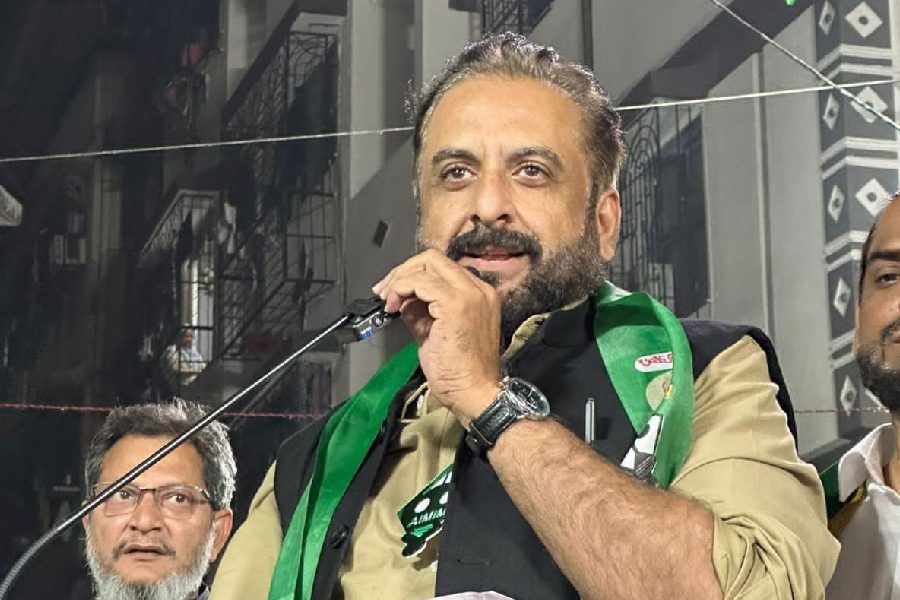 |
| Blaise Ekwalanga teaching Afrobeat at the Afro Fever Festival in Lisbon in February. Ananya Jahanara Kabir, who graduated from Presidency College, is on extreme right. Using an EU grant, Ananya will research Africa’s place in the evolution of dance elsewhere in the world. Photo credit: Joel Correia |
New Delhi, March 15: Ananya Jahanara Kabir, who graduated in English literature from Calcutta’s Presidency College, is now hoping to unearth hidden rhythmic connections tying the dance and music of Goa, Angola, Brazil and Mozambique.
Kabir, who will take up a position as a professor of English literature at King’s College London next month, is about to embark on a five-year research project to explore Africa’s place in the evolution of dance elsewhere in the world.
Her project, supported by the European Research Council (ERC), a funding agency set up by the European Union in 2007, will also investigate, among other things, why the salsa is so popular worldwide.
She is among 13 Indians who have been selected so far by the ERC for a special grant programme open to researchers worldwide from all disciplines, and offering up to 3.5 million euros (around Rs 24 crore) over a five-year period. Since the launch of the programme in 2007, the ERC has awarded grants to over 3,000 early career and senior scientists, but has received only 173 applications from Indians.
The ERC now wants more Indian researchers to apply for the grants that allow those selected to move to any place of their choice in Europe to pursue their research but allows them — if they so choose — the flexibility to retain their position in India.
“We’re looking for big ideas — a research proposal should explain how it’s going to change the field,” said Donald Dingwell, ERC secretary-general and a geophysicist who was in India this week talking to academic institutions about the grant programme.
The applications go to panels of experts who evaluate the research proposal itself as well as the achievements of the applicant, he said. Those who win the grants can negotiate the best conditions of work with their host institutions.
Dingwell said about 40 per cent of the grants so far had gone to projects in the life sciences, another 40 per cent to projects in the physical sciences, and the remaining grants to projects in the social sciences and humanities.
The ERC offers three types of grants — “starting grants” of 2 million euros for young scientists two to seven years after PhD, “consolidator grants” of 2.75 million euros for those with seven to 12 years’ experience after PhD, and “advanced grants” of up to 3.5 million euros to those with significant track record of research.
The recipients may employ team members based anywhere in the world — but a grant holder would be expected to spend at least half of the five-year period in a host European institution which could be a university, a laboratory, or even a company.
“Such a grant can be a liberating experience,” said Ramesh Pillai, a biologist and another Indian recipient who is based in the European Molecular Biology Laboratory in Grenoble, a town in southeastern France close to the Alps.
“We’re trying to understand the genetic machinery in our cells that safeguards the genome,” said Pillai, who has spent this week travelling with Dingwell, visiting several institutions in India, including Anna University, Chennai, the Indian Institute of Science, Bangalore, the Indian Institutes of Technology in Chennai, Mumbai, Delhi, and the Tata Institute of Fundamental Research.
ERC officials call it a “portable grant” for research in any topic and any field of study.
“I guess what they’re looking for is research ideas that hold the promise to expand the frontiers of knowledge,” said Pillai, who graduated from Kerala and pursued a Masters in biotechnology from IIT Roorkee, before pursing a PhD in Switzerland.
Pillai, who has been at the EMBL since 2006, said his proposal got selected in 2010 after an earlier application had been rejected.
Kabir’s project is the only one in the humanities from an Indian researcher. The other 12 recipients are investigating a range of sciences — from mathematics and cryptography to the immune system and plant biology.
Although her primary field of specialisation is literature, Kabir said she has long been fascinated by the challenge that other forms of cultural production pose to textual study. She is now focusing on dance — or the moving body, as she calls it.
“We’re trying to understand how written text, whether fictional, poetic, or academic can describe something as non-textual as rhythm,” said Kabir, who had obtained a doctorate from Trinity College, Cambridge. “One of our core objectives is to investigate what is the appropriate academic model of analysis for popular pleasures such as dance and music,” she said.










